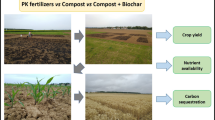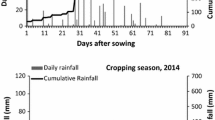Abstract
Most farming communities are reluctant to use municipal solid waste compost (MSWC) although the use of agriculture-based waste compost (AWC) is already highly popularized. The objective of this study was to comparatively assess MSWC and AWC considering their effects on soil acidity, salinity, fertility, and short-term crop yield response in a tropical Ultisol in Sri Lanka. Seven MSWC samples (samples named as S1 – S7) and two AWC samples (samples named as S8, S9) were applied in the field at 10 and 20 Mg ha−1 rates in two consecutive years with bush bean and maize in the first year, and only bush bean in the second year. The soil was initially acidic (pH: 5.3–5.7) and non-saline (Electrical conductivity, EC1:5 < 0.05 dS m−1). The pH significantly increased with the application of MSWC (6.4–7.6), but not with AWC (5.1–5.7). The application of MSWC increased the EC1:5 more significantly compared with AWC. Yields of both crops were > 35% lower compared with the expected average yield in all the treatments in the first year of cultivation. The yields of bush bean cultivation in the second year showed increases, however, slightly lower than the expected average yield. Yields were higher when the soils were comparatively higher in phosphorous (P) and potassium (K). Application of AWC did not produce high yields compared with MSWC. Results revealed that MSWC was comparable or better than AWC considering the crop yield response. However, the use of MSWC can be considered better suited for soils with more acidic conditions. The application of AWC is suitable, while MSWC is not, for soils with already high pH and saline conditions or when the expected crop prefers acidic soil reaction. Further experiments are required on effects of continuous applications on soils and methodologies for lowering the salinity levels of MSWC.


Similar content being viewed by others
References
Alzubaidi A, Aljanabi AS, Al-Rawi A (1990) Interaction between nitrogen and phosphorus fertilizers and soil salinity and its effect on growth and ionic composition of corn (Zea mays L.). In: El Bassam N, Dambroth M, Loughman BC (eds) Genetic Aspects of Plant Mineral Nutrition, Developments in Plant and Soil Sciences, Springer, Dordrecht, vol 42, pp 195–202. https://doi.org/10.1007/978-94-009-2053-8_30
Amin M, Flowers TH (2004) Evaluation of kjeldahl digestion method. J Res Sci 15:159–179
Baligar VC, Pitta GVE, Gama EEG, Schaffert RE, Bahia Filho ADC, Clark RB (1997) Soil acidity effects on nutrient use efficiency in exotic maize genotypes. Plant Soil 192:9–13. https://doi.org/10.1023/A:1004260222681
Clark GA, Stanley CD, Maynard DN (2000) Municipal solid waste compost as a soil amendment in irrigated vegetable production. TransAm Soc Agric Eng (ASAE) 0001-2351 / 00 / 4304-847 43:847–853
Cofie O, Nikiema J, Impraim R, Adamtey N, Paul J, Koné D (2016) Co-composting of solid waste and fecal sludge for nutrient and organic matter recovery Resource Recovery & Reuse Series 3. CGIAR Research Program on Water, Land and Ecosystems (WLE). Resource Recovery and Reuse Series No.3. Colombo, Sri Lanka: International Water Management Institute (IWMI)
Cointreau S (2007) The Growing Complexities and Challenges of Solid Waste Management in Developing Countries. World Bank. http://sandracointreau.com/wp-content/uploads/2011/02/Cointreau-ISWA-Amsterdam-Complexities-and-Challenges-2007.pdf (accessed 27.10.17)
De Araújo ASF, De Melo WJ, Singh RP (2010) Municipal solid waste compost amendment in agricultural soil: changes in soil microbial biomass. Rev Environ Sci Biotechnol 9:41–49. https://doi.org/10.1007/s11157-009-9179-6
Deal SB (1954) Flame Photometric Determination of Sodium and Potassium. Anal Chem 26:598–599. https://doi.org/10.1021/ac60087a063
DOA (2016) Field crop development & research institute, Department of Agriculture (DOA), Sri Lanka http://www.doa.gov.lk/FCRDI/index.php/en/crop (accessed 03.11.16.)
Ebelhar SA, Varsa EC (2000) Applications in sustainable production: Tillage and potassium placement effects on potassium utilization by corn and soybean. Commun Soil Sci Plant Anal 31(11–14):2367–2377. https://doi.org/10.1080/00103620009370591
Eubanks MW (2006) A genetic bridge to utilize Tripsacum germplasm in maize improvement. Maydica. 51:315–327
Fernandez MTH, Mataix-Solera J, Lichner L, Štekaurová V, Zaujec A, Izquierdo CG (2007) Assessing the microbiological, biochemical, soil-physical and hydrological effects of amelioration of degraded soils in semiarid Spain. Biologia. 62(5):542–546. https://doi.org/10.2478/s11756-007-0107-3
García-Gil JC, Plaza C, Soler-Rovira P, Polo A (2000) Long-term effects of municipal solid waste compost application on soil enzyme activities and microbial biomass. Soil Biol Biochem 32:1907–1913. https://doi.org/10.1016/S0038-0717(00)00165-6
Geebelen W, Adriano DC, Van Der Lelie D, Mench M, Carleer R, Clijsters H, Vangronsveld J (2003) Selected bioavailability assays to test the efficacy of amendment-induced immobilization of lead in soils. Plant Soil 249:217–228. https://doi.org/10.1023/A:1022534524063
Hargreaves JC, Adl MS, Warman PR (2008) A review of the use of composted municipal solid waste in agriculture. Agric Ecosyst Environ 123(1–3):1–14. https://doi.org/10.1016/j.agee.2007.07.004
Iglesias-Jimenez E, Alvarez C (1993) Apparent availability of nitrogen in composted municipal refuse. Biol Fertil Soils 16:313–318. https://doi.org/10.1007/BF00369312
Kawasaki T, Akiba T, Moritsugu M (1983) Effects of high concentrations of sodium chloride and polyethylene glycol on the growth and ion absorption in plants. Plant Soil 75:75–85. https://doi.org/10.1007/BF02178616
Kaya C, Kirnak H, Higgs D (2001) Effects of supplementary potassium and phosphorus on physiological development and mineral nutrition of cucumber and pepper cultivars grown at high salinity (NaCl). J Plant Nutr 24:1457–1471. https://doi.org/10.1081/PLN-100106995
Leelamanie DAL, Liyanage TDP (2016) Water repellent effects of manure amended soils on organic matter decomposition, C retention, and respired CO2-C. Biologia. 71:996–1001. https://doi.org/10.1515/biolog-2016-0127
Leelamanie DAL, Manawardana CU (2019) Soil hydrophysical properties as affected by solid waste compost amendments: seasonal and short-term effects in an Ultisol. J Hydrol Hydromechanics 67(3):232–239. https://doi.org/10.2478/johh-2019-0007
Liyanage TDP, Leelamanie DAL (2016) Influence of organic manure amendments on water repellency, water entry value, and water retention of soil samples from a tropical Ultisol. J Hydrol Hydromechanics 64:160–166. https://doi.org/10.1515/johh-2016-0025
Madrid IF, López R, Cabrera F (2007) Metal accumulation in soil after application of municipal solid waste compost under intensive farming conditions. Agric Ecosyst Environ 119(3–4):249–256. https://doi.org/10.1016/j.agee.2006.07.006
Mendoza J, Garrido T, Castillo G, Martin NS (2006) Metal availability and uptake by sorghum plants grown in soils amended with sewage from different treatments. Chemosphere 60:1033–1042. https://doi.org/10.1016/j.chemosphere.2006.05.012
Mkhabela M, Warman PR (2005) The influence of municipal solid waste compost on yield, soil phosphorus availability and uptake by two vegetable crops, grown in a Pugnash sandy loam soil in Nova Scotia. Agric Ecosyst Environ 106:57–67. https://doi.org/10.1016/j.agee.2004.07.014
Murphy J, Riley JP (1962) A modified single solution method for the determination of phosphate in natural waters. Anal Chim Acta 27:31–36. https://doi.org/10.1016/S0003-2670(00)88444-5
National Atlas of Sri Lanka (2007) Second Edition, Survey Department of Sri Lanka. Colombo, Sri Lanka
Ozanne PG (1980) Phosphate nutrition of plants - A general treatise. In: Khasawneh FE, Sample EC, Kamprath EJ (eds) The Role of Phosphorus in Agriculture. American Society of Agronomy. Madison, WI, pp 559–589
Panabokke CR (1996) Soils and agro-ecological environments of Sri Lanka. Natural Resources Series No.2. Natural Resources, Energy and Science Authority, Colombo, Sri Lanka
Papadopoulos I, Rendig VV (1983) Interactive effects of salinity and nitrogen on growth and yield of tomato plants. Plant Soil 73:47–57. https://doi.org/10.1007/BF02197756
Pettigrew WT (2008) Potassium influences on yield and quality production for maize, wheat, soybean and cotton. Physiol Plant 133:670–681. https://doi.org/10.1111/j.1399-3054.2008.01073.x
Piccolo A (2012) The nature of sol organic matter and innovative soil management to fight global changes and maintain agricultural productivity. In: Piccolo A (ed) Carbon sequestration in Agricultural soils: a multidisciplinary approach to innovative methods. Springer, Heidelberg, pp 1–20. https://doi.org/10.1007/978-3-642-23385-2
Rosen CJ, Halbach TR, Swanson BT (1993) Horticultural uses of municipal solid waste composts. HortTechnology 3:167–173. https://doi.org/10.21273/HORTTECH.3.2.167
Soil Survey Staff (2014) Keys to Soil Taxonomy, 12th edn. USDA-Natural Resources Conservation Service, Washington, DC
Walker DJ, Clemente R, Bernal P (2004) Contrasting effects of manure and compost on soil pH, heavy metals availability and growth of chemopodium album in a soil contaminated by pyritic mine waste. Chemosphere. 57:215–224. https://doi.org/10.1016/j.chemosphere.2004.05.020
World Bank (1999) What a Waste: Solid Waste Management in Asia. Washington, DC
Zaiter HZ, Coyne DP, Clark RB, Lindgren DT, Nordquist PT, Stroup WW, Pavlish LA (1992) Leaf chlorosis and seed yield of dry beans grown on high-pH calcareous soil following foliar iron sprays. HortScience 27:983–998. https://doi.org/10.21273/HORTSCI.27.9.983
Acknowledgments
This work was financially supported by a Research Grant by the National Research Council (NRC), Sri Lanka. (NRC 14 – 019).
Conflict of interest
As the authors of the manuscript, herewith we confirm that the study has not received any funds from interested parties, except for the NRC Research Grant grant [NRC 14–019] and that there are no conflicts of interest in any manner.
Author information
Authors and Affiliations
Corresponding author
Additional information
Publisher’s note
Springer Nature remains neutral with regard to jurisdictional claims in published maps and institutional affiliations.
Rights and permissions
About this article
Cite this article
Rupasinghe, I.S.U., Leelamanie, D.A.L. Comparison of municipal and agriculture-based solid waste composts: short-term crop-yield response and soil properties in a tropical Ultisol. Biologia 75, 809–818 (2020). https://doi.org/10.2478/s11756-020-00464-4
Received:
Accepted:
Published:
Issue Date:
DOI: https://doi.org/10.2478/s11756-020-00464-4




